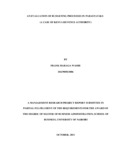| dc.contributor.author | Washe, Frank M | |
| dc.date.accessioned | 2016-05-18T16:19:08Z | |
| dc.date.available | 2016-05-18T16:19:08Z | |
| dc.date.issued | 2011 | |
| dc.identifier.uri | http://hdl.handle.net/11295/95778 | |
| dc.description.abstract | The Kenya Revenue Authority has undertaken various reforms and modernization programmes aimed at improving service delivery to its customers. In this regard the Authority has re-engineered its internal business processes and restructured its departments in line with its core business of revenue collection. However for the organization to realize the desired results from these initiatives it is imperative that financial management practices, such as budgeting processes be in conformity with best practice. The objective of this study was to evaluate budgeting processes at the Kenya Revenue Authority to determine if they are in conformity with best practice and to determine the extent to which budgeting processes at the Kenya Revenue Authority have achieved their objectives. The present study used a descriptive survey design. The target respondents of this study were 39 employees of Kenya Revenue Authority based at Times Tower. The respondents consisted of employees in management positions only. Data was obtained from primary sources. Data on extent of compliance with best practice and extent of achievement of budgeting objectives was collected through a questionnaire. Data was analyzed using descriptive statistical techniques.
The study found that budgeting processes at KRA had achieved their objectives. With respect to extend of achievement of budget planning objectives, an average mean of 3.61 was recorded. On the extent of achievement of budget implementation objectives, an
vi
average mean of 3.66 was recorded. Finally on the extent of achievement of budget control and performance evaluation objectives, a mean of 3.74 was recorded. The study also found that the budgeting processes at the KRA were in conformity with best practice. The budget planning process at KRA was found to be in conformity with best practice with an average mean score of 3.62.The budget implementation process at KRA was also found to be in conformity with best practice with an average mean score of 3.78.Finally the budget control and performance evaluation process at KRA was also found to be in conformity with best practices with an average mean score of 3.98. The study concludes that the budgeting processes at KRA have achieved their objectives. The study also concludes that the budgeting processes at KRA are in conformity with best practices. The study recommends that certain aspects of the budgeting processes in KRA be reviewed with a view of improving the processes in the future. For instance KRA management should ensure that systems are put in place to facilitate preparation of budgets which can adapt easily to changes in business environment. KRA management should also ensure that all budget proposals are subjected to cost benefit analysis test. This is important as it will ensure that only those budget proposals that add value are approved. The management of KRA should also consider sensitizing managers on the budgeting process to ensure that they clearly understand the quantifiable parameters used to judge their performance.
vii
The budget control and performance evaluation process at the organization needs to be enhanced, so as to provide managers with a deeper understanding of the key cost drivers for their departments. | en_US |
| dc.language.iso | en | en_US |
| dc.publisher | University of Nairobi | en_US |
| dc.rights | Attribution-NonCommercial-NoDerivs 3.0 United States | * |
| dc.rights.uri | http://creativecommons.org/licenses/by-nc-nd/3.0/us/ | * |
| dc.title | An evaluation of budgeting processes in parastatals (a case of Kenya revenue authority) | en_US |
| dc.type | Thesis | en_US |



